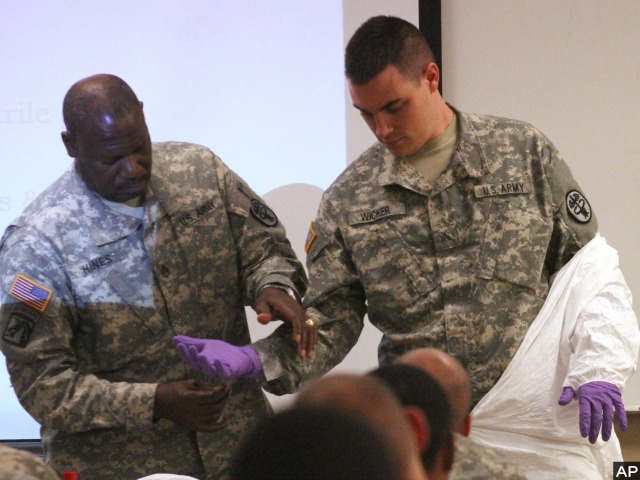The first large wave of soldiers from the U.S. Army’s legendary 101st Airborne Division arrived in Liberia over the weekend to battle the deadly Ebola virus, according to the Pentagon.
During a press briefing Tuesday, Army Col. Steve Warren, a Pentagon spokesman, said that about 100 additional Army troops arrived in Liberia over the weekend bringing the total number already there to an estimated 565.
“This 100 were part of the advance party from the 101st [Airborne] Division,” said Warren, referring to the soldiers from the storied division based at Fort Campbell, Kentucky.
Maj. Gen. Gary J. Volesky, the commander of the 101st Airborne Division, was quoted in an October 6 Associated Press article saying there were only a “handful of his soldiers” in Liberia last week.
On September 30, Rear Adm. John Kirby, the Pentagon’s press secretary, announced that a total of 700 soldiers from the 101st Airborne Division headquarters units would be deployed to Liberia by late October to confront the Ebola outbreak there.
While the Obama administration has decided to send the 101st Airborne Division to fight Ebola in Africa, there are no signs yet that the storied division will be send to battle Islamic State militants in Iraq where they have proven to be a decisive and formidable force during past conflicts.
An estimated 1,600 U.S. soldiers have already been dispatched to Iraq since June where they are advising Iraqi and Kurdish forces and providing security at the U.S. embassy and international airport in Baghdad.
In announcing the deployment of the division soldiers, Kirby said Gen. Volesky and his troops would assume “overall command of the effort” to deal with the Ebola threat in West Africa.
“U.S. military personnel are not and will not be providing direct care to Ebola patients,” also said Kirby, later adding, “there’s no ending date on this right now.”
The Pentagon is expecting the Ebola mission to take at least six months, but Kirby warned that it could last longer.
“All the troops that are going are getting trained on personnel protective equipment and on the disease itself,” explained Kirby.
Defense Secretary Chuck Hagel “has no higher priority than force protection and making sure that the threat down there is the disease…so just like any other threat, we take it very, very seriously, and we’ll make sure that they’ve got the protection that they need,” he added.
In mid-September, President Obama declared that the United States would deploy 3,000 soldiers to deal with the Ebola outbreak in West Africa.
However, on September 30, Kirby said that number could eventually “go higher.”
In addition to the 700 soldiers from the 101st Airborne Division, the Pentagon is planning to dispatch another 700 from a different engineering units throughout the U.S. to take charge of building the treatment facilities, among other things.
The Army said the 700 soldiers from the headquarters unit of the 101st Division (Air Assault) will be sent to Monrovia, Liberia to fight the Ebola virus as the Joint Force Command for Operation United Assistance.

COMMENTS
Please let us know if you're having issues with commenting.